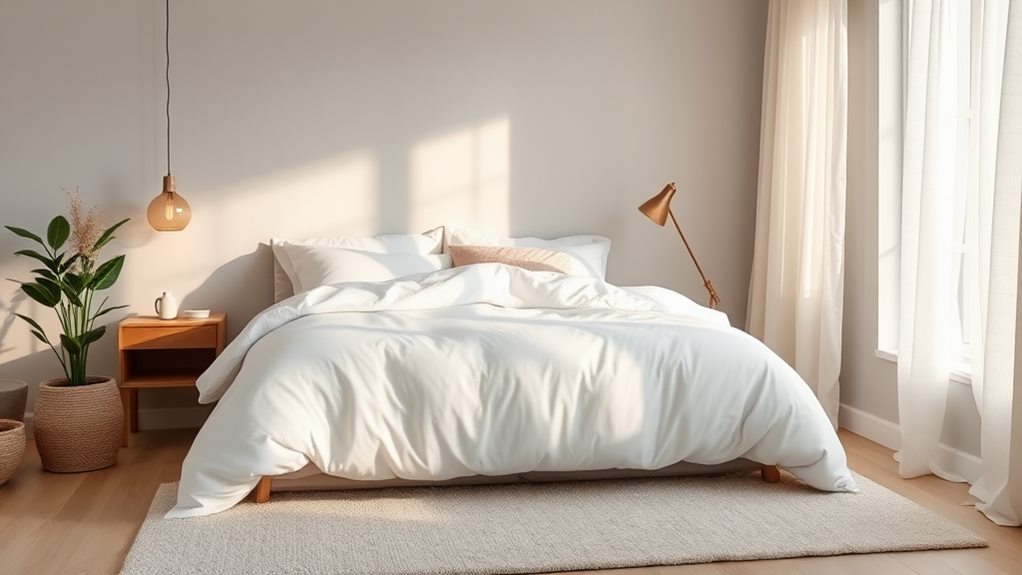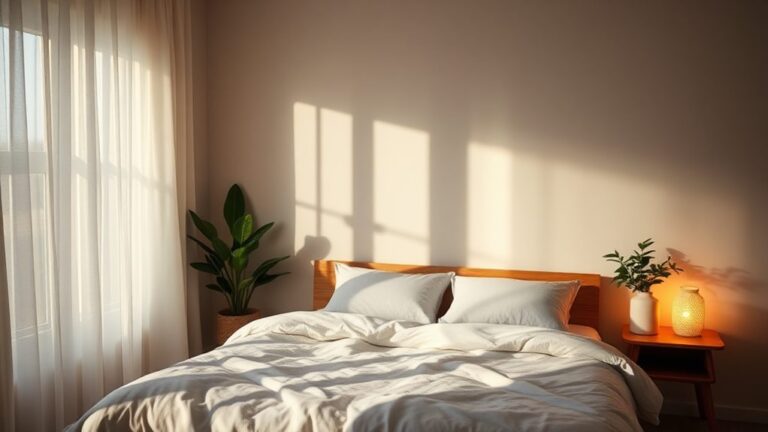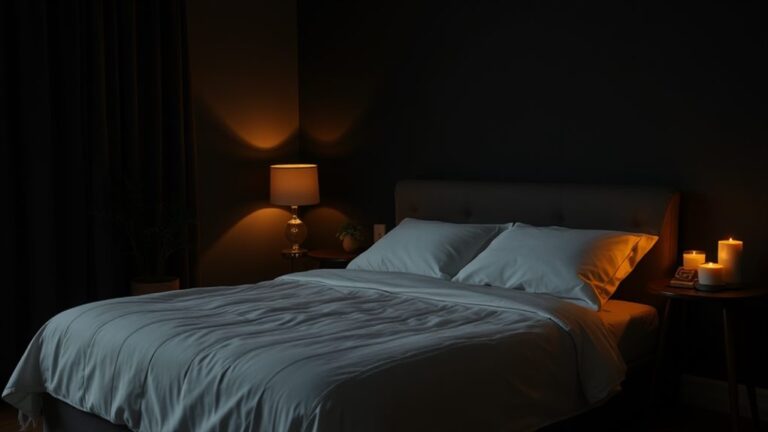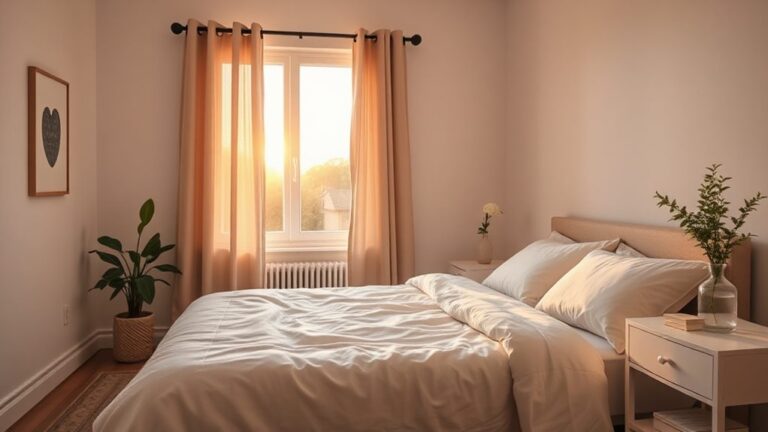You can transform your sleep in just five simple steps, establishing a consistent routine that leaves you feeling refreshed, revitalized, and ready to take on the day. Start by setting a consistent sleep schedule, going to bed and waking up at the same time every day. Next, create a bedtime routine that signals to your brain that it's time to sleep, such as incorporating soothing herbal teas or meditation. Make your bedroom sleep-friendly by ensuring it's dark, quiet, and at a comfortable temperature. Limit your exposure to screens and stimulating activities before bed, and you'll be on your way to discovering the full benefits of healthy sleep habits.
Nightcap Notes
- Establish a consistent sleep schedule to regulate the body's internal clock and improve sleep quality.
- Develop a calming pre-sleep routine to signal to the brain that it's time to sleep, promoting relaxation and reducing stress.
- Create a sleep-friendly bedroom environment that is dark, quiet, and at a comfortable temperature to promote relaxation and sleep.
- Limit exposure to screens and stimulating activities before bedtime to regulate the body's natural sleep-wake cycle and promote relaxation.
- Engage in calming activities before sleep, such as reading or listening to soothing music, to slow down the heart rate and calm the mind.
Set a Consistent Sleep Schedule
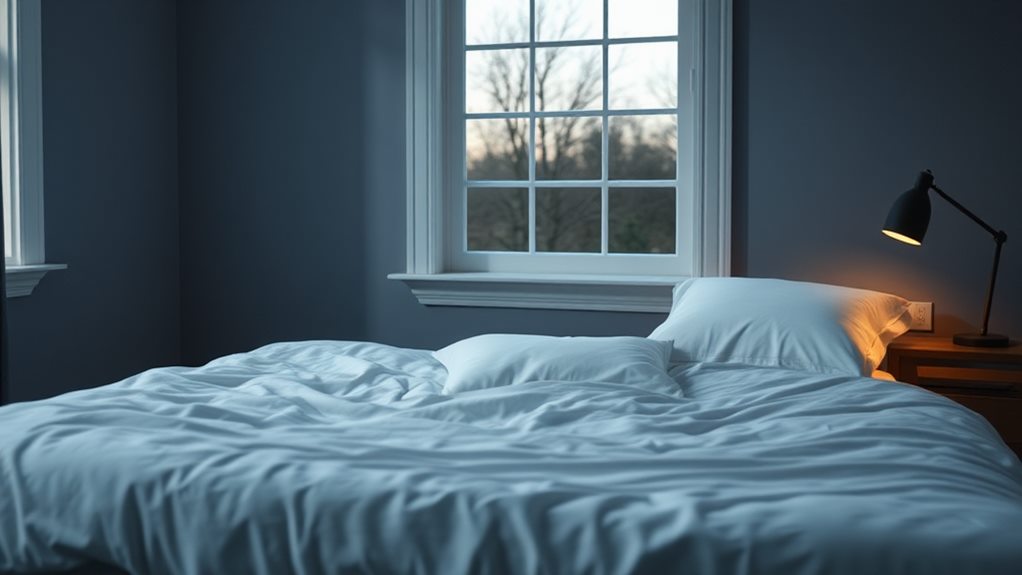
Because your body's internal clock regulates your sleep-wake cycle, setting a consistent sleep schedule is essential for developing healthy sleep habits.
You go to bed and wake up at the same time every day, including weekends, which helps regulate your body's internal clock. This consistency will help you feel more alert and awake during the day, and more relaxed and sleepy at night.
You'll also want to establish a consistent sleep schedule that allows you to get the right amount of sleep each night.
Most adults need 7-9 hours of sleep, so you'll want to set your bedtime and wake-up time accordingly. For example, if you need 8 hours of sleep, you'll want to go to bed at the same time every night and wake up 8 hours later.
Create a Bedtime Routine
Now that you've established a consistent sleep schedule, you can start focusing on other habits that will help improve your sleep quality.
Creating a bedtime routine is essential to signal to your brain that it's time to sleep. Develop a calming pre-sleep routine that includes activities like reading a book, taking a warm bath, or practicing gentle stretches. Consider incorporating soothing herbal teas, such as those found on Sip to Sleep, into your routine to promote relaxation.
Avoid stimulating activities like watching TV or scrolling through your phone, as they can interfere with your sleep.
Your bedtime routine should be relaxing and predictable. Start winding down at least 30 minutes before bedtime to allow your body to shift into sleep mode.
Dim the lights, and reduce noise levels to create a peaceful atmosphere. You can also try journaling, meditation, or deep breathing exercises to calm your mind.
Consistency is key, so stick to your routine even on weekends or days off. By creating a bedtime routine, you'll be able to unwind and prepare your body for a restful night's sleep, improving the quality of your sleep over time.
Make adjustments as needed until you find a routine that works best for you.
Make Your Bedroom Sleep-Friendly
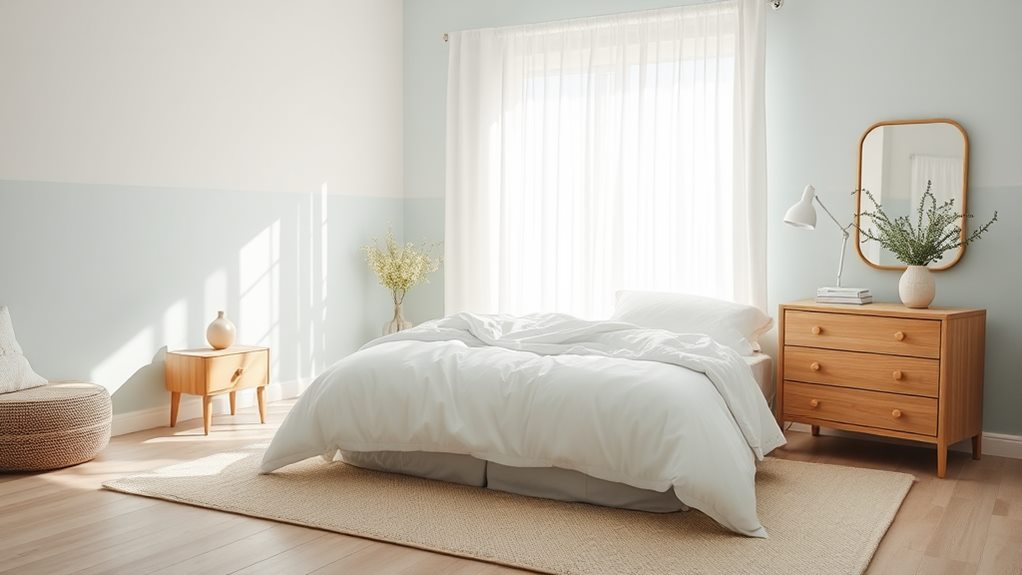
Creating a sleep-conducive environment is crucial for improving the quality of your sleep. You spend a third of your life in your bedroom, so make it a sleep haven.
Start by ensuring your bedroom is dark, quiet, and at a comfortable temperature. Consider using blackout curtains, earplugs, or a white noise machine if necessary. Invest in a comfortable mattress and pillows to provide the right support for your body.
Designing the perfect sleep sanctuary involves more than just the basics, it requires careful consideration of the bedroom layout and furniture sleep-friendly bedroom furniture. This can include choosing multi-functional furniture pieces that promote relaxation.
Make your bedroom a sleep sanctuary by removing any distractions.
Keep your bedroom clutter-free and organized, and avoid storing work materials or electronics in your bedroom. Use calming colors on your walls and add plants to create a relaxing atmosphere.
Consider using aromatherapy, such as lavender, to promote relaxation. By creating a sleep-friendly environment, you'll be able to relax and unwind, making it easier to fall asleep and stay asleep.
This, in turn, will help you wake up feeling refreshed and ready to take on the day.
Limit Exposure to Screens Before Bed
Your sleep sanctuary is set, but there's another significant factor that can disrupt your sleep: screens.
You're probably used to staring at screens all day, from your phone to your computer to your TV.
But when it's time to wind down, screens can be a major obstacle to sleep. In fact, a sleep-conducive environment isn't just about avoiding screens, but also about creating a calming atmosphere with soothing colors, such as the dreamy hues that can promote relaxation.
The right colors can even help regulate your body's natural sleep-wake cycle.
The blue light emitted by screens suppresses melatonin production, making it harder to fall asleep.
And it's not just the light itself – the stimulating content on screens can keep your brain active and alert, making it tough to relax.
**Suppresses melatonin production, making it harder to fall asleep
- Keeps your brain active and alert with stimulating content
- Can lead to a lighter, less restorative sleep
- Can disrupt your body's natural sleep-wake cycle
Try to avoid screens for at least an hour before bedtime.
Instead, read a book, listen to calming music, or practice relaxation techniques to help you wind down.
Avoid Stimulating Activities Before Sleep
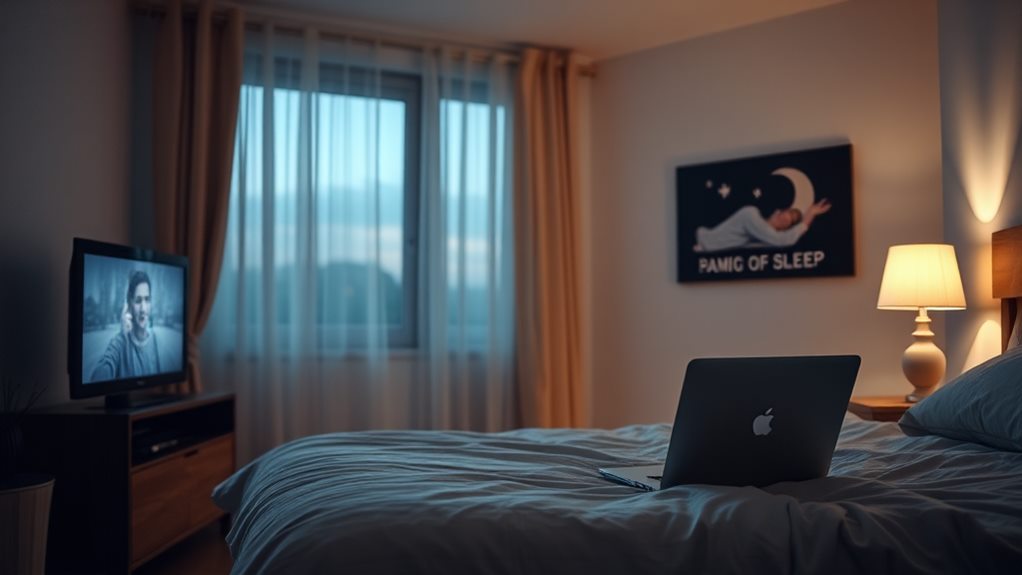
A restful night's sleep can be just out of reach when you're wired from a stimulating activity.
Whether it's an intense workout, a thrilling movie, or an engaging video game, these activities release adrenaline and increase alertness. This makes it difficult for your body to wind down and relax, causing a lighter, less restorative sleep.
Before bedtime, try to avoid stimulating activities that might interfere with your sleep.
Instead, choose calming ones that promote relaxation. You can read a book, take a warm bath, or listen to soothing music. Opt for activities that slow down your heart rate and calm your mind, making it easier to drift off to sleep.
Frequently Asked Questions
Can Sleep Habits Be Changed at Any Age?
You can change your sleep habits at any age, no matter how set in your ways you feel.
Your brain is capable of adapting to new routines and habits, even as an adult.
Don't worry if you've struggled with sleep in the past – you can start fresh today.
Small changes can add up, and you'll be sleeping like a pro in no time.
Just take control and start making adjustments now.
How Long Does It Take to Establish a New Sleep Habit?
Time ticks away, like grains of sand in an hourglass, as you wonder how long it takes to establish a new sleep habit.
You'll be relieved to know it's not an eternity! Research shows it can take around 21 to 30 days to form a new habit.
You'll start noticing subtle changes in your sleep patterns within a week or two. Consistency is key, so stick to your schedule and you'll be sleeping like a baby in no time!
Can Certain Foods or Drinks Disrupt Sleep Patterns?
You're wondering if certain foods or drinks can disrupt sleep patterns?
Yes, they can. You'll want to limit or avoid consuming heavy meals, caffeine, and sugary snacks close to bedtime. These can stimulate your body and brain, making it harder to fall asleep.
You'll also want to steer clear of spicy or acidic foods that can cause discomfort and indigestion, keeping you awake. Make smart choices to guarantee a restful night's sleep.
Is It Possible to Get Too Much Sleep?
You're probably wondering if it's possible to get too much sleep.
The answer is yes, you can! Oversleeping can be just as problematic as undersleeping. When you sleep too much, you're likely to feel groggy, disoriented, and even depressed.
Your body needs a balance of rest and activity to function properly. You'll want to aim for 7-9 hours of sleep each night to feel rested and refreshed, without overdoing it.
Can Sleep Habits Affect Mental Health and Mood?
You're probably wondering if your sleep habits can impact your mental health and mood.
The answer is yes, they definitely can. When you don't get enough sleep or your sleep schedule is irregular, you're more likely to feel anxious, depressed, or irritable.
On the other hand, establishing a consistent sleep routine can boost your mood and reduce stress.
Conclusion
You've got the secret to sweet dreams in the bag! By setting a consistent sleep schedule, creating a calming bedtime routine, making your bedroom a sleep sanctuary, limiting screen time, and dodging stimulating activities before bed, you'll be snoozing like a pro in no time. Your body (and mind) will thank you for adopting these healthy habits, and you'll wake up feeling refreshed, revitalized, and ready to tackle the day with a spring in your step.

